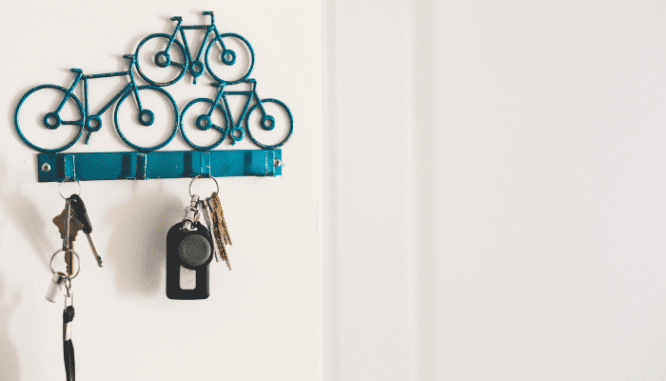Is Renting Worth It? Debunking Some Common Myths
- Published on
- 6 min read
-
 Ben Walker Contributing AuthorClose
Ben Walker Contributing AuthorClose Ben Walker Contributing Author
Ben Walker Contributing AuthorBen Walker is a content marketing writer with a passion for exploring new writing topics and getting lost in real estate listings. His specialties include real estate, travel, credit cards, and personal finance. Ben's work has been featured in The Washington Post, MSN, Fox Business, and Thrive Global.
Should you buy a home or continue renting? It’s an age-old question and common answers often lean heavily on the side of buying a house. This isn’t surprising — it seems everyone wants to achieve the dream of becoming a homeowner and having their monthly payments go toward an investment.
But does buying a house make sense for everyone? Is renting worth it in some cases?
The United States has over 43 million rented homes — a number that has risen by over 15 million from 1975 to 2020. Housing affordability and availability may have contributed to this rise in renters, but these aren’t the only factors to consider.
Everyone has their own situation and your reasons for renting vs. buying determine which is the better choice. And sometimes — dramatic pause — it’s going to be renting. Yes, you read correctly. Renting may be the best option for you depending on the situation.
Not quite convinced? No worries! We’ve gathered the data and expert opinions to fill you in on what factors to consider for renting or buying a home, when renting might be the smarter option, and the pros and cons of each. This will help you decide which route is best for you when it’s time to choose.

Factors to consider if you’re thinking about buying a house
Buying a home is part of the American dream, but it’s not a decision to take lightly. If you want to buy a house, you should consider the increased responsibilities of homeownership, including ongoing home repairs and maintenance.
In addition, make sure you’re prepared for the financial factors involved with the homebuying process. Here’s a checklist of questions to keep in mind if you’re thinking about buying a house:
How much debt do you carry?
When you purchase a home using a mortgage, you’ll have to meet the lender’s debt-to-income — or DTI — requirements. Typically, lenders like to see a DTI of 45% or less (though some can go up to 50%), including your monthly mortgage payment. If you’re already carrying a heavy burden of monthly debt payments that eat up a good chunk of your income, you may not qualify for a mortgage at all.
Becoming a homeowner is a huge financial commitment, so consider paying down other types of debt before taking this step.
Do you have an emergency fund?
The point of an emergency fund is to provide financial stability, typically for three to six months, in case of an unforeseen situation. If you buy a home and then lose your job, will you have enough money (including paying for a mortgage) to get by while searching for new employment?
Do you have enough money for a down payment?
Most homebuyers need to put something down to purchase a home. You may not be required to pay 10% to 20% down on a new house (low down payment options are widely available, and some loans even offer zero down payment), but it’s still not a bad idea if you want to lower the overall cost of your loan. This includes paying enough to avoid PMI, or private mortgage insurance, which is often required if your down payment is less than 20% on a conventional loan.
Do you have money for closing costs?
It’s not uncommon to have closing costs that add up to 2% to 5% of your loan amount. If we take the median sale price of $341,600 for all U.S. homes sold in April 2021, 3% in closing costs would be $10,248.
Do you have a good credit score?
The higher your credit score, the better your chances of qualifying for a home loan with a lower interest rate. Shooting for a very good (740 to 799) or excellent (800 and above) credit score on the FICO scoring model should be your goal, though it’s possible to secure a loan with a lower credit score. For example, a government-backed FHA loan may only require a credit score in the 500s to qualify, depending on your down payment.
Will combined monthly homeownership costs be less than rent?
Consider how much your combined monthly homeownership costs will be. This includes (but certainly isn’t limited to) mortgage payments, homeowners insurance, property taxes, utilities, and possible HOA fees. Then compare this amount to how much you pay in rent. This will give you a good idea of whether your monthly costs will be similar or drastically different.
Do you plan to stay in this home for several years?
If you’re planning on moving within a year or two, buying a house might not make the most financial sense, though it depends on each situation. With expenses like down payments, closing costs, and moving, you’ll pay more upfront for a home. Additionally, it may take years before you build enough equity in your home to walk away with a profit when you sell it.
When might it be better to rent?
You might decide to rent instead of buying for multiple reasons, which could include the state of your financial situation. If you’re in the middle of paying off a lot of debt, it likely wouldn’t make sense financially to add all the costs of homeownership into the mix. But you can use renting as a stepping stone on the path to having your own home.
If you’re not yet ready for the long-term commitment of buying a place and want time to plan out your next steps, you might decide renting is worth it. You don’t have to feel like it’s a waste of time or money.
“Renting is providing you a home,” says Cissy Clark, a top real estate agent with 19 years of experience in Bakersfield, California.
“Having a home is not wasting your money. Renting a home to have a roof over your head for your family or for yourself is not frivolous, it’s a necessity.”
In addition, your job might require you to travel or move around a lot, which isn’t always conducive to living the life of a homeowner. In this type of situation, it could be beneficial to have the flexibility of renting.

Pros of buying
Mortgage payments add to your equity
Every mortgage payment you make adds to your equity (that’s your ownership share) in the home. This is often one of the most common arguments for buying vs. renting because in most renting situations your monthly payments aren’t going toward building your wealth.
Home appreciation
Your home can appreciate over time, which means it can grow in value. This could be a result of factors in the market where you live, such as a company moving into your area and offering hundreds of new jobs. Or you might be able to increase the value of your home with home improvements (but be aware of low-value home improvements).
Tax advantages
Homeownership can offer certain tax advantages, such as a mortgage interest tax deduction. This type of deduction can help you save money on your taxes each year.
Your home is your own
When you own a home, you get to do what you want with it. Paint the walls, hang pictures, and make the space your own — because it is your own! However, do be mindful of HOA rules, if there are any.
Privacy
You can’t do much about the neighbors in the apartment next door, above you, or below you when you’re renting. But in your own house, it doesn’t have to seem like the whole apartment complex is part of your home. Rather, you get some privacy.
Cons of buying
Uncertain appreciation
Houses can appreciate, but it doesn’t mean they will. And you can’t know how much appreciation will occur, if any.
Non-liquid asset
A liquid asset is cash or something that can be easily converted to cash. Houses aren’t liquid assets. If you want to tap into your home equity, you have to sell or refinance your house. Selling isn’t necessarily a quick process and you have to pay agent fees, and closing costs, as well as a down payment on a new home if you’re buying one. Refinancing can free up some money, but you’ll still have debt and interest payments.
Home maintenance
Owning a home isn’t cheap and every little cost adds up. Depending on the state of your home and what needs to be repaired or replaced, you could easily spend thousands maintaining your HVAC system, windows, gutters, appliances, and more.
Inflexible
What are you supposed to do with your home if you want to go on a long vacation or relocate? What about if you don’t like your neighbors? Owning a home lets you be flexible with your home space, but it also makes it harder to just get up and leave when you want.
Down payment
A down payment on a house could be tens of thousands of dollars. That’s a lot of cash, which you might not have on hand. Renting may require a deposit, but it’s often significantly less than what you’d put down for a home. “If you rent for $1,500 a month, you might put $3,000 down,” says Clark. “If you maintain the property that you’re borrowing, you get it [the deposit] back.” (Though keep in mind that your down payment is putting equity into your home, and even though it’s not liquid, it still belongs to you!)
Additional expenses
Home maintenance costs aren’t the only expenses you have to worry about. Here are a few additional expenses to keep in mind:
- Property taxes
- Homeowners insurance
- Utility bills
- HOA fees
- Private mortgage insurance

Pros of renting
Flexibility
Compared to buying, renting isn’t necessarily a long-term deal. The length of rental leases can vary, but one year is a common term. This gives you freedom to move onto something else in a short amount of time.
Low (or no) maintenance or repair costs
The renter isn’t often on the hook if something needs to be repaired or replaced in a rented home.
Potentially lower monthly payments
Your monthly rent payments may be less expensive than a mortgage for a home, though it depends on the situation.
Access to amenities
Many apartment complexes or other types of commonly-rented communities provide access to amenities like pools and clubhouses. Free access to these types of amenities can save you money on a gym membership.
Lower insurance costs
The National Association of Insurance Commissioners reported the average yearly cost of renters insurance to be $180. This is much lower than the $1,211 average yearly cost of homeowners insurance.
Lower utility costs
Certain rental costs, such as water or garbage pickup, may be included in your monthly payments. A homeowner would have to cover these costs themselves.
Less financial risk
Renters aren’t at risk if a rental unit depreciates in value because it’s not their property.
Cons of renting
Increased rent rates
It may be built into your rental agreement that your rent can’t change or can’t change by more than a certain percentage. But what about once the lease is up? Going from lease to lease can have different variables, such as the price of rent changing.
No home equity
Your monthly rent payments aren’t building you any equity in a home because it’s not your property. It doesn’t mean renting is not worth it, but it does mean you aren’t necessarily putting money toward an investment.
No tax deductions
Renters don’t receive the tax advantages that homeowners do, such as a tax deduction for the interest paid toward a mortgage.
No home appreciation
Since you don’t own the property, you can’t enjoy the benefits of a home’s appreciation.
Less freedom and privacy
It’s not your home, so you likely can’t customize it exactly how you want. This often means no renovations or permanent changes to the home. In addition, many rented homes, including apartments, may offer less privacy than a place you own.

Is renting worth it?
At the end of the day, buying a home isn’t always a smart investment and renting isn’t always a waste of time and money. It depends on what’s best for you.
You should assess your current situation to see if renting is worth it or if buying is a better option. Consider the long-term costs and benefits. How long do you plan to be in your new place? If it’s less than a few years, renting might be the way to go because of the upfront and ongoing costs associated with buying. And if you sell a home soon after buying, the real estate agent commission (often around 6%) could cut into your profit.
But if you plan to be in your home for at least five years, it could be worth it to buy. Your home should hopefully appreciate each year and raise its overall value. This can offset the home’s continuing maintenance expenses, which can cost about 1% of your home’s purchase price each year.
Remember to weigh all the pros and cons before deciding whether to rent or buy, and then select the option that works best for your current situation. If it’s renting, don’t believe the myth that having a roof over your head isn’t a good investment. And if it’s buying, connect with a top real estate agent to find your dream home.
Header Image Source: (Matthew Henry / Burst)
